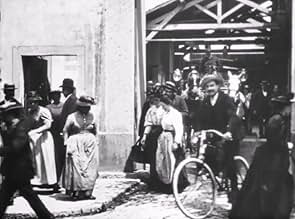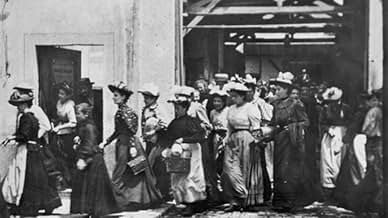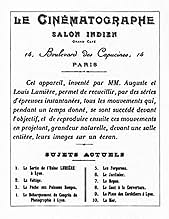IMDb RATING
6.8/10
8.1K
YOUR RATING
Workers leaving the Lumière factory for lunch in Lyon, France in 1895; a place of great photographic innovation and one of the birth places of cinema.Workers leaving the Lumière factory for lunch in Lyon, France in 1895; a place of great photographic innovation and one of the birth places of cinema.Workers leaving the Lumière factory for lunch in Lyon, France in 1895; a place of great photographic innovation and one of the birth places of cinema.
- Director
Featured reviews
Story says that on that on December 28, 1895, a small group of thirty-three people was gathered at Paris's Salon Indien Du Grand Café to witness the Cinématographe, a supposedly new invention that resulted from the work done by a couple of photographers named August and Louis Lumière. The small audience reunited that day (some by invitation, most due to curiosity) didn't really know what to expect from the show, and when a stationary photograph appeared projected on a screen, most thought that the Cinématographe was just another fancy devise to present slide-show projections. Until the photograph started to move. What those thirty-three people experienced in awe that cold day of December was the very first public screening of a moving picture being projected on a screen; history was being written and cinema as we know it was born that day.
Of the 10 short movies that were shown during that historic day, "La Sortie Des Usines Lumière" (literally "Exiting the Lumière Factory") was the very first to be screened. The film shows the many workers of the Lumière factory as they walk through the gates of the factory, leaving the building at the end of a hard day of work. While a very basic "actuality film" (movie depicting a real event), the movie took everyone in the audience by surprise, as their concept of moving pictures was limited to Edison's "Peep Show" machines (the Kinetoscope), the brothers' invention was like nothing they had seen before and so the audience stood in awe, as the people and the horses moved across the screen. The idea wasn't entirely new (Le Prince shot the first movie as early as 1888), but the way of showing the movie was simply revolutionary.
"La Sortie Des Usines Lumière" would become the first in the long series of "actuality films" that the Lumière would produce over the years. This primitive form of documentary was the brothers' favorite kind of film because they were more interested in the technological aspects of their invention than in the uses the Cinématographe could have. Despite the initial lack of enthusiasm, after the first showing the Cinématographe became a great success and "La Sortie Des Usines Lumière" quickly became an iconic image of that first screening. It definitely wasn't the first movie the brothers shot that year, and it probably wasn't the best of the 10 movies shown that day (personally I think that "L' Arroseur Arrosé" was the best of the 10); however, it is really meaningful that the very first movie was the opening of a pair of gates, as literally, this movie opened the gates to cinema as we know it. 8/10
Of the 10 short movies that were shown during that historic day, "La Sortie Des Usines Lumière" (literally "Exiting the Lumière Factory") was the very first to be screened. The film shows the many workers of the Lumière factory as they walk through the gates of the factory, leaving the building at the end of a hard day of work. While a very basic "actuality film" (movie depicting a real event), the movie took everyone in the audience by surprise, as their concept of moving pictures was limited to Edison's "Peep Show" machines (the Kinetoscope), the brothers' invention was like nothing they had seen before and so the audience stood in awe, as the people and the horses moved across the screen. The idea wasn't entirely new (Le Prince shot the first movie as early as 1888), but the way of showing the movie was simply revolutionary.
"La Sortie Des Usines Lumière" would become the first in the long series of "actuality films" that the Lumière would produce over the years. This primitive form of documentary was the brothers' favorite kind of film because they were more interested in the technological aspects of their invention than in the uses the Cinématographe could have. Despite the initial lack of enthusiasm, after the first showing the Cinématographe became a great success and "La Sortie Des Usines Lumière" quickly became an iconic image of that first screening. It definitely wasn't the first movie the brothers shot that year, and it probably wasn't the best of the 10 movies shown that day (personally I think that "L' Arroseur Arrosé" was the best of the 10); however, it is really meaningful that the very first movie was the opening of a pair of gates, as literally, this movie opened the gates to cinema as we know it. 8/10
For almost anyone with an interest in the earliest motion pictures, watching this footage of workers leaving the Lumière factory never gets old. Its historical significance, as the first movie that Louis Lumière showed at the first public demonstration of his cinematograph, would certainly make it well worth remembering for that reason alone. But beyond Lumière's visionary and technical abilities, he also had a knack for choosing material for his features that was interesting in itself.
This particular subject could not have been more appropriate for his first public presentation. The seemingly simple footage is almost a microcosm of the new world created by cinema. The widely varying reactions of the various workers (not to mention the occasional dog) contain almost every common reaction to the camera: some are curious and don't mind showing it, some are curious and pretend not to be, some are a little uncomfortable, some seem to be fascinated by having their picture taken. With the 'cast' as large as it is, you can watch the film a good number of times and still not lose interest.
Beyond that, the way that the camera field is set up shows an innate sense of the value of movement, particularly movement towards the camera, in holding the attention of the audience. Some of Lumière's best films made further use of this idea.
In one very short movie, this film preserves an important step in cinema history, while also containing material that, in a sense, portrays and foresees many of the future effects of the Lumière brothers' invention. That we can experience both, any time that we view this footage of these long-past men and women and their honest reactions to the camera, is still fascinating.
This particular subject could not have been more appropriate for his first public presentation. The seemingly simple footage is almost a microcosm of the new world created by cinema. The widely varying reactions of the various workers (not to mention the occasional dog) contain almost every common reaction to the camera: some are curious and don't mind showing it, some are curious and pretend not to be, some are a little uncomfortable, some seem to be fascinated by having their picture taken. With the 'cast' as large as it is, you can watch the film a good number of times and still not lose interest.
Beyond that, the way that the camera field is set up shows an innate sense of the value of movement, particularly movement towards the camera, in holding the attention of the audience. Some of Lumière's best films made further use of this idea.
In one very short movie, this film preserves an important step in cinema history, while also containing material that, in a sense, portrays and foresees many of the future effects of the Lumière brothers' invention. That we can experience both, any time that we view this footage of these long-past men and women and their honest reactions to the camera, is still fascinating.
Forget the "twists" you've seen in films like Psycho (1960), The Sixth Sense(1999), and the Crying Game(1992), LEAVING THE LUMIERE FACTORY (1895) blows those plot points out of the water and takes it rightful place as the biggest shock in movie history.
December 28, 1895, The Grand Cafe' in Paris, France. Only 33 out of 100 tickets are sold to the first ever demonstration of the Lumiere Cinematograph. A jaded, French crowd sits in the theater waiting to see this mystery invention they know nothing about. The lights go down. A static, barren shot of the front door of a factory is projected onto the screen. Several seconds go by before a man stands up and shouts in disappointment, "It's just the old Magic Lantern!" (the magic lantern was a primitive slide projector for still photographs) Suddenly, the doors of the factory on screen miraculously swing open, a crowd of women pour out into the frame and a seizure of--believe it or not!--motion happens within the picture. Needless to say, the audience was caught completely off guard, and were absolutely dumbstruck.
Can you imagine it?! The audience had co clue that the picture would move! They must have went bonkers! It would be like you watching Jerry Maguire, and then Tom Cruise walks right out of the screen and sits down next to you!
When those French ladies opened the doors to the Lumiere Factory, they were also opening the doors to a whole new world of art and entertainment!
December 28, 1895, The Grand Cafe' in Paris, France. Only 33 out of 100 tickets are sold to the first ever demonstration of the Lumiere Cinematograph. A jaded, French crowd sits in the theater waiting to see this mystery invention they know nothing about. The lights go down. A static, barren shot of the front door of a factory is projected onto the screen. Several seconds go by before a man stands up and shouts in disappointment, "It's just the old Magic Lantern!" (the magic lantern was a primitive slide projector for still photographs) Suddenly, the doors of the factory on screen miraculously swing open, a crowd of women pour out into the frame and a seizure of--believe it or not!--motion happens within the picture. Needless to say, the audience was caught completely off guard, and were absolutely dumbstruck.
Can you imagine it?! The audience had co clue that the picture would move! They must have went bonkers! It would be like you watching Jerry Maguire, and then Tom Cruise walks right out of the screen and sits down next to you!
When those French ladies opened the doors to the Lumiere Factory, they were also opening the doors to a whole new world of art and entertainment!
This one-minute film is arguably the first movie ever made. Other inventors had previously filmed actions - like Edison's motion photography of a sneeze - but the Lumiere brothers developed equipment that tremendously advanced the medium. At the time, of course, their `cinematograph' must have bewildered their peers, including their subjects. In this first instance, the brothers record employees leaving their factory, some of whom understandably struggle to hide their awareness of the camera. The Lumieres attempt to make the film more entertaining by introducing animals and a bicycle, but `La Sortie Des Usines Lumiere' doesn't nearly match the ingenuity of their later films. The most interesting aspect of this short film is the brothers' selection of a familiar working class ritual as their subject. Their choice is the initial evidence of their curiosity about all of the world's people, a quality that makes viewing their experiments immensely rewarding and fascinating today.
Rating: 8
Rating: 8
This is it!! if your looking for a thrilling few minutes of the French leaving work then it does not get any better than this.Action to look out for includes,
French woman walking at the screen, French bloke wobbling on his bike, The closing of the gates cliff-hanger Finale.
Oh and its maybe the most important few minutes in the history of cinema.
French woman walking at the screen, French bloke wobbling on his bike, The closing of the gates cliff-hanger Finale.
Oh and its maybe the most important few minutes in the history of cinema.
Did you know
- TriviaIt was the first film ever to be projected to a paying audience.
- Alternate versionsThree versions of the film exist. There are a number of differences between them, such as the clothing styles worn by the workers change to reflect the different seasons the versions were shot in, and the horse-drawn carriage that appears in the first version is pulled by one horse, two horses in the second version, and no horse and no carriage in the third version.
- ConnectionsEdited into The Lumière Brothers' First Films (1996)
Details
- Release date
- Country of origin
- Official sites
- Language
- Also known as
- Employees Leaving the Lumière Factory
- Filming locations
- Production company
- See more company credits at IMDbPro
- Runtime
- 1m
- Color
- Sound mix
- Aspect ratio
- 1.33 : 1
Contribute to this page
Suggest an edit or add missing content






















